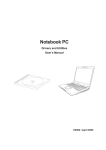Download Acer Aspire 5000 Series User`s guide
Transcript
Aspire 3000/5000 Series User's Guide Copyright © 2005. Acer Incorporated. All Rights Reserved. Aspire 3000/5000 Series User's Guide Original Issue: March 2005 Changes may be made periodically to the information in this publication without obligation to notify any person of such revisions or changes. Such changes will be incorporated in new editions of this manual or supplementary documents and publications. This company makes no representations or warranties, either expressed or implied, with respect to the contents hereof and specifically disclaims the implied warranties of merchantability or fitness for a particular purpose. Record the model number, serial number, purchase date, and place of purchase information in the space provided below. The serial number and model number are recorded on the label affixed to your computer. All correspondence concerning your unit should include the serial number, model number, and purchase information. No part of this publication may be reproduced, stored in a retrieval system, or transmitted, in any form or by any means, electronically, mechanically, by photocopy, recording, or otherwise, without the prior written permission of Acer Incorporated. Aspire 3000/5000 Series Notebook Computer Model Number: __________________________________ Serial Number: ___________________________________ Purchase Date: ___________________________________ Place of Purchase: ________________________________ Acer and the Acer logo are registered trademarks of Acer Incorporated. Other companies' product names or trademarks are used herein for identification purposes only and belong to their respective companies. iii First things first We would like to thank you for making the Aspire series of notebook computers your choice for your mobile computing needs. Your guides To help you use your Aspire, we have designed a set of guides: First off, the Just for starters... poster helps you get started with setting up your computer. The printed User's Guide introduces you to the basic features and functions of your new computer. For more on how your computer can help you to be more productive, please refer to the AcerSystem User's Guide. This guide contains detailed information on such subjects as system utilities, data recovery, expansion options, and troubleshooting. In addition it contains warranty information and the general regulations and safety notices for your notebook. It is available in Portable Document Format (PDF) and comes preloaded on your notebook. Follow these steps to access it: 1 Click on Start, All Programs, AcerSystem. 2 Click on AcerSystem User's Guide. Note: Viewing the file requires Adobe Acrobat Reader. If Adobe Acrobat Reader is not installed on your computer, clicking on AcerSystem User's Guide will run the Acrobat Reader setup program first. Follow the instructions on the screen to complete the installation. For instructions on how to use Adobe Acrobat Reader, access the Help and Support menu. Basic care and tips for using your computer Turning your computer on and off To turn on the computer, simply press and release the power button below the LCD screen beside the launch keys. See "Front view" on page 1 for the location of the power button. To turn the power off, do any of the following: • Use the Windows shutdown command Click on Start, Turn Off Computer; then click on Turn Off. • Use the power button iv Note: You can also use the power button to perform power management functions. See "Moving around" on page 43 of the AcerSystem User's Guide. • Use the customized functions for power management You can also shut down the computer by closing the display cover, or by pressing the sleep hot key <Fn> + <F4>. See "Moving around" on page 43 of the AcerSystem User's Guide. Note: If you cannot power off the computer normally, press and hold the power button for more than four seconds to shut down the computer. If you turn off the computer and want to turn it on again, wait at least two seconds before powering up. Taking care of your computer Your computer will serve you well if you take care of it. • Do not expose the computer to direct sunlight. Do not place it near sources of heat, such as a radiator. • Do not expose the computer to temperatures below 0 ºC (32 ºF) or above 50 ºC (122 ºF). • Do not subject the computer to magnetic fields. • Do not expose the computer to rain or moisture. • Do not spill water or any liquid on the computer. • Do not subject the computer to heavy shock or vibration. • Do not expose the computer to dust and dirt. • Never place objects on top of the computer. • Do not slam the computer display when you close it. • Never place the computer on uneven surfaces. Taking care of your AC adaptor Here are some ways to take care of your AC adaptor: • Do not connect the adaptor to any other device. • Do not step on the power cord or place heavy objects on top of it. Carefully route the power cord and any cables away from foot traffic. • When unplugging the power cord, do not pull on the cord itself but pull on the plug. • The total ampere ratings of the equipment plugged in should not exceed the ampere rating of the cord if you are using an extension cord. Also, the total current rating of all equipment plugged into a single wall outlet should not exceed the fuse rating. v Taking care of your battery pack Here are some ways to take care of your battery pack: • Use only batteries of the same kind as replacements. Turn the power off before removing or replacing batteries. • Do not tamper with batteries. Keep them away from children. • Dispose of used batteries according to local regulations. Recycle if at all possible. Cleaning and servicing When cleaning the computer, follow these steps: 1 Power off the computer and remove the battery pack. 2 Disconnect the AC adaptor. 3 Use a soft, moist cloth. Do not use liquid or aerosol cleaners. If either of the following occurs: • the computer has been dropped or the body has been damaged. • the computer does not operate normally. Please refer to "Frequently asked questions" on page 23. Caution Changes or modifications not expressly approved by the manufacturer could void the user's authority, which is granted by the Federal Communications Commission, to operate this computer. Operation conditions This device complies with Part 15 of the FCC Rules. Operation is subject to the following two conditions: (1) this device may not cause harmful interference, and (2) this device must accept any interference received, including interference that may cause undesired operation. Users are requested to follow the RF safety instructions on wireless option devices that are included in the user's manual of each RF option device. An improper installation or unauthorized use may cause harmful interference to radio communications. Also any tampering of the internal antenna will void the FCC certification and your warranty. To prevent radio interference to the licensed service, this device is intended to be operated indoors and installation outdoors is subject to licensing. For more information about our products, services, and support information, please visit our website: http://global.acer.com. iii iii iii Turning your computer on and off Taking care of your computer Taking care of your AC adaptor Taking care of your battery pack Cleaning and servicing iii iv iv v v An Aspire tour Front view Closed front view Left view Right view Rear view Base view Specifications Indicators Launch keys Touchpad Touchpad basics Using the keyboard Lock keys and embedded numeric keypad Windows keys Hot keys Special keys Ejecting the optical (CD or DVD) drive tray Using a computer security lock Audio Adjusting the volume Using the system utilities Acer eManager Acer GridVista (dual-display compatible) Launch Manager Frequently asked questions Requesting service 1 1 2 3 3 4 5 6 9 10 11 11 13 13 14 14 16 17 17 18 18 19 19 20 22 23 27 Contents First things first Your guides Basic care and tips for using your computer International Travelers Warranty (ITW) Before you call Arcade (for selected models) 27 27 29 1 After setting up your computer as illustrated in the Just for Starters... poster, let us show you around your new Aspire computer. Front view # Item Description 1 Display screen Also called Liquid-Crystal Display (LCD), displays computer output. 2 Microphone Internal microphone for sound recording. 3 Keyboard For entering data into your computer. 4 Palmrest Comfortable support area for your hands when you use the computer. English An Aspire tour English 2 # Item Description 5 Click buttons (Left, center and right) The left and right buttons function like the left and right mouse buttons; the center button serves as a 4-way scroll button. 6 Touchpad Touch-sensitive pointing device which functions like a computer mouse. 7 Status indicators Light-Emitting Diodes (LEDs) that turn on and off to show the status of the computer’s functions and components. 8 Launch keys Buttons for launching frequently used programs. See “Launch keys” on page 14 for more details. 9 Power button Turns the computer on and off. Closed front view # Item Description 1 Speakers Left and right speakers deliver stereo audio output. 2 Power indicator Lights up when the computer is on. 3 Battery indicator Lights up when the battery is being charged. 4 Bluetooth communication button/indicator (for selected models) Press to enable/disable the Bluetooth function. Indicates the status of Bluetooth communication (optional). 5 Wireless communication button/indicator Press to enable/disable the wireless function. Indicates the status of wireless LAN communication (optional). 6 Line-in jack Accepts audio line-in devices (e.g., audio CD player, stereo walkman). 7 Mic-in jack Accepts inputs from external microphones. 3 Item Description 8 Speaker/Line-Out/ Headphone jack Connects to audio line-out devices (e.g., speakers, headphones). 9 USB 2.0 port Connects to Universal Serial Bus (USB) 2.0 devices (e.g., USB mouse, USB camera). Left view # Item Description 1 Optical drive Internal optical drive; accepts CDs or DVDs depending on the optical drive type. 2 LED indicator Lights up when the optical drive is active. 3 Emergency eject hole Ejects the optical drive tray when the computer is turned off 4 Optical drive eject button Ejects the optical drive tray from the drive. Right view # Item Description 1 PC Card slot eject button Ejects the PC Card from the slot. 2 PC Card slot Accepts one Type II CardBus PC Card. English # English 4 # Item Description 3 Two USB 2.0 ports Connect to Universal Serial Bus (USB) 2.0 devices (e.g., USB mouse, USB camera). 4 Network jack Connects to an Ethernet 10/100 based network. 5 Modem jack Connects to a phone line. 6 Ventilation slots Enable the computer to stay cool, even after prolonged use. Rear view # Item Description 1 Power jack Connects to an AC adaptor. 2 External display port Connects to a display device (e.g., external monitor, LCD projector). 3 Security keylock Connects to a Kensington-compatible computer security lock. 5 English Base view # Item Description 1 Hard disk bay Houses the computer's hard disk (secured by a screw). 2 Battery release latch Releases the battery for removal. 3 Battery bay Houses the computer's battery pack. 4 Battery lock Locks the battery in place. 5 Cooling fan Helps keep the computer cool. Note: Do not cover or obstruct the opening of the fan. 6 Memory compartment Houses the computer's main memory. English 6 Specifications Operating system Microsoft® Windows® XP Home Edition (Service Pack 2) Microsoft® Windows® XP Professional (Service Pack 2) Platform Mobile AMD Turion 64 processor ML-28/ML-30 or higher Mobile AMD Sempron processor 2600+ to 3000+ or higher System memory 256 or 512 MB of DDR333 memory, upgradeable to 2 GB using two soDIMM modules Display and graphics 15" XGA color TFT LCD with 1024 x 768 pixel resolution 15.4" WXGA color TFT LCD with 1280 x 800 pixel resolution 15.4" WXGA Acer CrystalBrite color TFT LCD with 1280 x 800 pixel resolution 16.7 million colors SiS M760GX integrated 3D graphics, with up to 128 MB of video memory supporting Microsoft® DirectX® 8.0 Dual independent display support MPEG-2/DVD hardware-assisted capability Storage subsystem Dimensions and weight 40/60/80 GB ATA/100 hard disk drive Optical drive options: • DVD-Dual • DVD/CD-RW combo 364 (W) x 279 (D) x 33.9/38.9 (H) mm (14.3 x 11 x 1.3/1.5 inches) 2.76 kg (6.08 lbs.) for 15" XGA LCD model 2.8 kg (6.17 lbs.) for 15.4" WXGA LCD model Power subsystem ACPI 1.0b power management standard: supports standby and hibernation power-saving modes 29 W Li-ion battery pack 2.5-hour rapid charge, 3.5-hour charge-in-use 3-pin 65 W AC adaptor Input devices 88-/89-key keyboard inverted "T" cursor layout; 2.5 mm (minimum) key travel Touchpad with 4-way integrated scroll button 12 function keys; four cursor keys; two Windows® keys; hotkey controls; embedded numeric keypad; international language support Four easy-launch buttons: Internet browser, email with LED, Empowering Key, and one user-programmable button Two front-panel buttons: wireless LED-button and Bluetooth® LED-button Audio Audio system with two built-in speakers Sound Blaster Pro™ and MS-Sound compatible Built-in microphone 7 Modem: 56K ITU V.92 modem with PTT approval; Wake-on-Ring ready LAN: 10/100 Mbps Fast Ethernet; Wake-on-LAN ready Wireless LAN (optional): integrated miniPCI 802.11b/g Wi-Fi CERTIFIED™ solution Acer SignalUp wireless technology support Wireless PAN (optional): integrated Bluetooth® I/O interface Three USB 2.0 ports Ethernet (RJ-45) port Modem (RJ-11) port External display (VGA) port Microphone/line-in jack Headphones/speaker/line-out port Type II PC Card slot DC-in jack for AC adaptor Security Kensington lock slot BIOS user and supervisor passwords Software Acer Launch Manager Acer eManager (eSetting/ePresentation/eRecovery) Acer Arcade Acer GridVista (for selected model only) Acer System Recovery CD Norton AntiVirus™ Adobe® Reader® NTI CD-Maker™ Options and accessories System compliance 256 or 512 MB and 1 GB soDIMM memory Li-ion battery pack 65 W AC adaptor Mobile PC 2001 ACPI 1.0b DMI 2.0 Wi-Fi® Warranty One-year International Travelers Warranty (ITW) Note: The specifications listed above are for reference only. The exact configuration of your PC depends on the model purchased. English Communication English 8 9 The computer has three easy-to-read status indicators on the upper-right above the keyboard, and four on the front panel. The power, battery, and wireless communication status indicators are visible even when the LCD display is closed. Icon Function Description Caps Lock Lights up when Caps Lock is activated. Num Lock Lights up when Num Lock is activated. Media activity Indicates when the hard disk or optical drive is active. Bluetooth Indicates the status of Bluetooth communication. Wireless LAN Indicates the status of wireless LAN communication. Power Lights up when the computer is on. Battery Lights up when the battery is being charged. 1. Charging: the light shows amber when the battery is charging. 2. Fully charged: light shows green when in AC mode. English Indicators English 10 Launch keys Located at the upper-right, above the keyboard are four buttons. These buttons are called launch keys. They are: mail, Web browser, Acer Empowering Key " ," and one user-programmable button. Press " " to run the Acer eManager. Please see "Acer eManager" on page 19. The mail and Web buttons are pre-set to email and Internet programs, but can be reset by users. To set the Web browser, mail and programmable keys, run the Acer Launch Manager. See "Launch Manager" on page 22. Launch key Default application P User-programmable Acer eManager (user-programmable) Web browser Internet browser (user-programmable) Mail Email application (user-programmable) 11 The built-in touchpad is a pointing device that senses movement on its surface. This means the cursor responds as you move your finger across the surface of the touchpad. The central location on the palmrest provides optimum comfort and support. Touchpad basics The following items show you how to use the touchpad: • Move your finger across the touchpad (2) to move the cursor. • Press the left (1) and right (4) buttons located beneath the touchpad to perform selection and execution functions. These two buttons are similar to the left and right buttons on a mouse. Tapping on the touchpad is the same as clicking the left button. • Use the 4-way scroll (3) button to scroll up or down and move left or right a page. This button mimics your cursor pressing on the right scroll bar of Windows applications. English Touchpad English 12 Right button (4) Function Left button (1) Execute Quickly click twice. Tap twice (at the same speed as double-clicking a mouse button). Select Click once. Tap once. Drag Click and hold, then use finger on the touchpad to drag the cursor. Tap twice (at the same speed as double-clicking a mouse button); rest your finger on the touchpad on the second tap and drag the cursor. Access context menu Scroll Main touchpad (2) Center button (3) Click once. Click and hold to move up/down/ left/right. Note: Keep your fingers dry and clean when using the touchpad. Also keep the touchpad dry and clean. The touchpad is sensitive to finger movement, hence, the lighter the touch, the better the response. Tapping harder will not increase the touchpad's responsiveness. 13 The keyboard has full-sized keys and an embedded keypad, separate cursor keys, two Windows keys and twelve function keys. Lock keys and embedded numeric keypad The keyboard has three lock keys which you can toggle on and off. Lock key Description Caps Lock When Caps Lock is on, all alphabetic characters typed are in uppercase. Num Lock <Fn> When Num Lock is on, the embedded keypad is in numeric + <F11> mode. The keys function as a calculator (complete with the arithmetic operators +, -, *, and /). Use this mode when you need to do a lot of numeric data entry. A better solution would be to connect an external keypad. Scroll Lock <Fn> + <F12> When Scroll Lock is on, the screen moves one line up or down when you press the up or down arrow keys respectively. Scroll Lock does not work with some applications. The embedded numeric keypad functions like a desktop numeric keypad. It is indicated by small characters located on the upper right corner of the keycaps. English Using the keyboard English 14 To simplify the keyboard legend, cursor-control key symbols are not printed on the keys. Desired access Num Lock on Number keys on embedded keypad Type numbers in a normal manner. Cursor-control keys on Hold <Shift> while using embedded keypad cursor-control keys. Main keyboard keys Num Lock off Hold <Fn> while using cursor-control keys. Hold <Fn> while typing Type the letters in a letters on embedded keypad. normal manner. Windows keys The keyboard has two keys that perform Windows-specific functions. Key Description Windows key Pressed alone, this key has the same effect as clicking on the Windows Start button; it launches the Start menu. It can also be used with other keys to provide a variety of functions: < > + <Tab> Activates the next Taskbar button. < > + <E> < > + <F1> Opens Help and Support. < > + <F> Opens the Find: All Files dialog box. < > + <R> Opens the Run dialog box. < > + <M> <Shift> + < (< Opens the My Computer window. Minimizes all windows. > + <M> Undoes the minimize all windows > + <M>) action Application This key has the same effect as clicking the right mouse key button; it opens the application's context menu. Hot keys The computer employs hot keys or key combinations to access most of the computer's controls like screen brightness, volume output and the BIOS utility. 15 Hot key Icon Function Description <Fn> + <F1> Hot key help Displays help on hot keys. <Fn> + <F2> Acer eSetting Launches Acer eSetting in Acer eManager. See "Acer eManager" on page 19. <Fn> + <F3> Acer Power Launches Power Management options. Management <Fn> + <F4> Sleep Puts the computer in Sleep mode. <Fn> + <F5> Display toggle Switches display output between the display screen, external monitor (if connected) and both. <Fn> + <F6> Screen blank Turns the display screen backlight off to save power. Press any key to return. <Fn> + <F7> Touchpad toggle Turns the internal touchpad on and off. <Fn> + <F8> Speaker toggle Turns the speakers on and off. <Fn> + <↑> Volume up Increases the sound volume. <Fn> + <↓> Volume down Decreases the sound volume. <Fn> + <→> Brightness up Increases the screen brightness. English To activate hot keys, press and hold the <Fn> key before pressing the other key in the hot key combination. English 16 Hot key Icon Function Description <Fn> + <←> Brightness down Decreases the screen brightness. Special keys You can locate the Euro symbol at the upper-center and/or bottom-right of your keyboard. To type: The Euro symbol 1 Open a text editor or word processor. 2 Either directly press the <Euro> key at the bottom-right of the keyboard, or hold <Alt Gr> and then press the <5> key at the upper-center of the keyboard. Note: Some fonts and software do not support the Euro symbol. Please refer to www.microsoft.com/typography/faq/faq12.htm for more information. The US dollar sign 1 Open a text editor or word processor. 2 Either directly press the <Dollar> key at the bottom-right of the keyboard, or hold <Shift> and then press the <4> key at the upper-center of the keyboard. Note: This function varies according to the language settings. 17 To eject the optical drive tray when the computer is turned on, press the drive eject button. When the power is off, you can eject the drive tray by using the emergency eject hole. Using a computer security lock A security keylock notch, located on the left hand side of the computer, lets you connect a Kensington-compatible computer security lock. Wrap the computer security lock cable around an immovable object such as a table or handle of a locked drawer. Insert the lock into the notch and turn the key to secure the lock. Some keyless models are also available. English Ejecting the optical (CD or DVD) drive tray English 18 Audio The computer comes with 16-bit high-fidelity AC'97 stereo audio, and dual stereo speakers. Adjusting the volume Adjusting the volume on the computer is as easy as pressing some buttons. See "Hot keys" on page 14 for more information on adjusting the speaker volume. 19 Acer eManager The innovative Acer eManager software is designed for easy access to frequently used functions. Press " ," to launch the Acer eManager user interface, featuring three main settings: Acer eSettings, Acer ePresentation and Acer eRecovery . To set the " " key, see "Launch keys" on page 10. Acer ePresentation simplifies resolution settings when connecting to a projector. Acer eRecovery creates backups and recovers system configurations reliably. Acer eSettings makes managing system settings and security easy. For more information, open Acer eManager, click on the appropriate application and select the Help function. English Using the system utilities English 20 Acer GridVista (dual-display compatible) Note: This feature is only available on certain models. To enable the dual monitor feature of your notebook, first ensure the second monitor is connected, then, select Start, Control Panel, Display and click on Settings. Select the secondary monitor (2) icon in the display box and then click the check box Extend my windows desktop onto this monitor. Finally, Apply the new settings and click OK to complete the process. Acer GridVista is a handy utility that offers four pre-defined display settings so you can view multiple windows on the same screen. To access this function, please go to Start, All Programs and click on Acer GridVista. You may choose any one of the four display settings indicated below: Double (Vertical), Triple (Major at left), Triple (Major at right), or Quad Acer Gridvista is dual-display compatible, allowing two displays to be partitioned independently. Acer GridVista is simple to set up: 1 Run Acer GridVista and select your preferred screen configuration for each display from the taskbar. 2 Drag and drop each window into the appropriate grid. 21 Enjoy the convenience of a well-organized desktop. Note: Please ensure the resolution setting of your second monitor is set to the manufacturer's recommended value. English 3 English 22 Launch Manager Launch Manager allows you to set the four launch keys located above the keyboard. "Launch keys" on page 10 for the location of the launch keys. You can access the Launch Manager by clicking on Start, All Programs, and then Launch Manager to start the application. 23 The following is a list of possible situations that may arise during the use of your computer. Easy answers and solutions are provided for each one. I pressed the power button and opened the display, but the computer does not start or boot-up. Look at the power indicator: • • If it is not lit, no power is being supplied to the computer. Check the following: • If you are using on the battery, it may be low and unable to power the computer. Connect the AC adaptor to recharge the battery pack. • Make sure that the AC adaptor is properly plugged into the computer and to the power outlet. If it is lit, check the following: • Is a non-bootable (non-system) disk in the external USB floppy drive? Remove or replace it with a system disk and press <Ctrl> + <Alt> + <Del> to restart the system. Nothing appears on the screen. The computer's power management system automatically blanks the screen to save power. Press any key to turn the display back on. If pressing a key does not turn the display back on, three things might be the cause: • The brightness level might be too low. Press <Fn> + <→> (increase) to adjust the brightness level. • The display device might be set to an external monitor. Press the display toggle hot key <Fn> + <F5> to toggle the display back to the computer. • If the Sleep indicator is lit, the computer is in Sleep mode. Press and release the power button to resume. Image is not full-screen. Each computer display has a different native resolution depending on the screen. If you set the resolution lower than this native resoution, the screen expands to fill the computer display. Right-click on your Windows desktop and select Properties to bring up the "Display Properties" dialog box. Then click on the Settings tab to make sure that the resolution is set to the appropriate resolution. Resolutions lower than the specified resolution are not full-screen on the computer or on an external monitor. English Frequently asked questions English 24 No audio is heard from the computer. Check the following: • The volume may be muted. In Windows, look at the volume control (speaker) icon on the taskbar. If it is crossed-out, click on the icon and deselect the Mute option. • The volume level may be too low. In Windows, look at the volume control icon on the taskbar. You can also use the volume control buttons to adjust the volume. See "Hot keys" on page 14 for more detail. • If headphones, earphones or external speakers are connected to the lineout port on the computer, the internal speakers automatically turn off. I want to eject the optical drive tray without turning on the power. I cannot eject the optical drive tray. There is a mechanical eject hole on the optical drive. Simply insert the tip of a pen or paperclip and push to eject the tray. The keyboard does not respond. Try attaching an external keyboard to a USB 2.0 port on the computer. If it works, contact your dealer or an authorized service center as the internal keyboard cable may be loose. The infrared port does not work. Check the following: • Make sure that the infrared ports of the two devices are facing each other (+/- 15 degrees) a maximum of 1 meter apart. • Make sure there is a clear path between the two infrared ports. Nothing should be blocking the ports. • Make sure you have the appropriate software running on both devices (for file transfers) or you have the appropriate drivers (for printing to an infrared printer). • During the POST, press <F2> to access the BIOS utility and verify that the infrared port is enabled. • Make sure both devices are IrDA-compliant. The printer does not work. Check the following: • Make sure that the printer is connected to a power outlet and that it is turned on. 25 Make sure that the printer cable is connected securely to the computer's parallel port or a USB port and the corresponding port on the printer. I want to set up my location to use the internal modem. To properly use your communication software (e.g. HyperTerminal), you need to set up your location: 1 Click on Start, Settings, Control Panel. 2 Double-click on Modems. 3 Click on Dialing Properties and begin setting up your location. Refer to the Windows manual. Note: Please note, on first booting your notebook, that you can skip the Internet Connection setup, as it is not necessary to complete the installation of your Operating System. After the Operating System is setup, you can proceed with the Internet Connection setup. I want to restore my computer to its original settings without recovery CDs. Note: If your system is the multilingual version, the operating system and language you choose when you first turn on the system will be the only option for future recovery operations. This recovery process helps you restore the C: drive with the original software content that is installed when you purchase your notebook. Follow the steps below to rebuild your C: drive. (Your C: drive will be reformatted and all data will be erased.) It is important to back up all data files before you use this option. Before performing a restore operation, please check the BIOS settings. 1 Check to see if Acer disk-to-disk recovery is enabled or not. 2 Make sure the D2D Recovery setting in Main is Enabled. 3 Exit the BIOS setup utility and save changes. The system will reboot. Note: To activate the BIOS setup utility, press <F2> during POST. 1 Restart the system. English • English 26 2 While the Acer logo is showing, press <Alt> + <F10> at the same time to enter the recovery process. 3 Refer to the on-screen instructions to perform system recovery. Important: This feature occupies 2 to 3 GB in a hidden partition on your hard drive. 27 International Travelers Warranty (ITW) Your computer is backed by an International Travelers Warranty (ITW) that gives you security and peace of mind when traveling. Our worldwide network of service centers are there to give you a helping hand. An ITW passport comes with your computer. This passport contains all you need to know about the ITW program. A list of available, authorized service centers is in this handy booklet. Read this passport thoroughly. Always have your ITW passport on hand, especially when you travel, to receive the benefits from our support centers. Place your proof-of-purchase in the flap located inside the front cover of the ITW passport. If the country you are traveling in does not have an Acer-authorized ITW service site, you can still get in contact with our offices worldwide. Please consult http://global.acer.com. Before you call Please have the following information available when you call Acer for online service, and please be at your computer when you call. With your support, we can reduce the amount of time a call takes and help solve your problems efficiently. If there are error messages or beeps reported by your computer, write them down as they appear on the screen (or the number and sequence in the case of beeps). You are required to provide the following information: Name: _____________________________________________ Address: ___________________________________________ Telephone number: _________________________________ Machine and model type: ____________________________ Serial number: ______________________________________ Date of purchase: ___________________________________ English Requesting service English 28











































